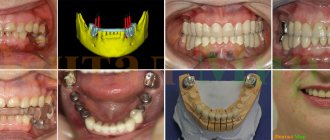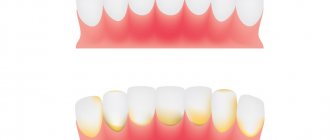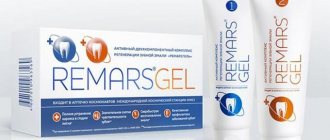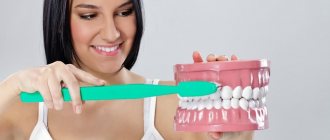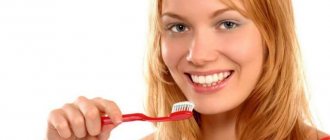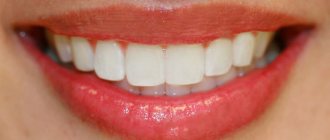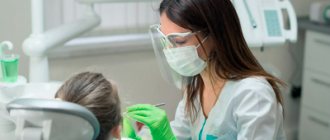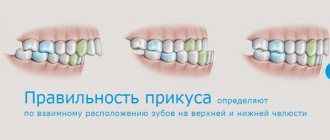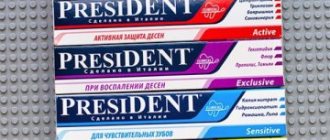Almost everyone knows about how dental hygiene affects the general condition of the body. And in fact, anyone can debate this topic.
But, nevertheless, the undeniable fact is that the general health of a person largely depends on the health of teeth and gums. This has been confirmed by various scientific medical studies. Inflammatory processes on the teeth and gums, as well as heavy plaque and other deposits lead to an increase in the number of pathogenic microbes that can provoke a large number of diseases. Heart and vascular diseases, the development of diabetes, complications during pregnancy and premature birth - these and other health problems can arise due to small microbes on the teeth.
As medical dental practice shows, caries, gingivitis and tartar almost always occur due to improper oral hygiene. Having heard the phrase “you are brushing your teeth incorrectly” from a dentist, most patients are very surprised and begin to give other reasons for the development of their diseases, be it heredity, sensitive enamel or crowded teeth.
What is the right and wrong way to care for your teeth?
There are research results that clearly show that 99%
Problems of teeth and gums arise from improper care.
And there is data that shows the opposite picture, as in Switzerland, where regular oral hygiene is instilled almost from infancy. Only 3% of the population suffers from caries. Children are taught to brush their teeth correctly at an early age, special lessons are given at school, and they need to visit the dentist every six months.
As they say, feel the difference.
The formula for dental health looks like this:
proper home care + regular visits to the dentist = healthy teeth and gums
According to statistics, in Russia only 30% of the population brushes their teeth correctly; the rest, alas, do not do this for various reasons. Most often this is due to the inability to brush your teeth properly and a lax attitude towards your health.
Why is it necessary to brush your teeth?
Proper dental and oral care is important not only because it keeps your teeth white and your breath fresh. A so-called bacterial film is constantly formed on the teeth, mucous membranes, and tongue. This is a complex structure consisting of an intercellular matrix, components of oral fluid, various bacteria and their metabolic products. The oral cavity is a very favorable environment for the growth of bacteria. Microorganisms contained in the bacterial film, during their life processes, release substances that destroy enamel and cause inflammation of the gums. Over time, hard tissues are destroyed and carious cavities form.
Bacterial film, or biofilm, in dentistry is a set of microorganisms that are firmly attached to each other and at the same time quite tightly attached to the teeth and mucous membrane.
Actinomycetes, fungi, spirochetes, and fusobacteria that live in large numbers are called periodontopathogenic and cariogenic: modern studies have shown their leading role in the development of periodontal inflammation and dental caries “The structure of biofilm on natural teeth,” Dr. Vincent Zijnge, MD [4]
Oral health is of great importance for the health of the entire body, including the immune and digestive systems. An example of such a relationship is the condition of the teeth and the process of chewing food. If the teeth do not fully perform their functions, the food is not crushed as it should be (for example, because it is painful or uncomfortable for a person to chew), then a poorly processed food bolus ends up in the stomach. It lingers longer, is digested less well and can later cause discomfort and disruption of intestinal function. Thus, knowing how to properly care for your teeth is important for the normal functioning of the entire body.
Professional care
At an appointment with a specialist, teeth are cleaned with ultrasound.
A special device will remove plaque from the enamel and formed stones at the base of the teeth and under the gums. This procedure is virtually painless. You can't do this yourself. Stones and plaque appear after drinking tea, coffee, and cigarettes. The doctor will check the oral cavity for diseases (periodontal disease) and damage to the enamel (caries). If necessary, he will select the correct treatment and recommend proper dental care.
To strengthen tooth enamel, a specialist can perform fluoridation. It can be ordinary and deep, when special preparations are placed at the base of the tooth, which quickly restores the enamel.
Teeth whitening is carried out using the Air Flow system. It allows you to restore the natural color of your teeth and destroys bacteria. A special sandblasting machine is used, inside of which there is a special solution and an abrasive mixture. With its help, plaque is removed and tooth enamel is polished.
How often should you brush your teeth?
It is believed that you need to brush your teeth at least twice a day. There is a very practical justification for this. Brushing in the morning removes bacteria that have accumulated in the mouth overnight. Cleaning in the evening before bed helps remove bacterial plaque that has accumulated during the day and inhibits the formation of biofilm at night.
Another widely known tip is to brush your teeth for at least 2 minutes. One jaw consists of three conventional parts: chewing teeth on the right and left, and the front part. It is necessary to pay sufficient attention to each department.
What should a toothbrush be like?
Dentists often recommend buying toothbrushes with stiff bristles. Don't trust them! First of all, decide for yourself whether you can tolerate such harsh care, or whether you should pay attention to a brush with medium and soft bristles. If you have dental hypersensitivity, i.e. damage to tooth enamel or gum disease, then a “hard” brush is strictly contraindicated for you. In addition, it is worth considering buying an electric toothbrush: it cleans the tooth surface more thoroughly than a regular one and ensures the safety of the gum epithelium, which can easily be damaged when in contact with a mechanical toothbrush.
Why do you need toothpaste and floss?
What hygiene supplies are needed to properly care for your oral cavity? First of all, a toothbrush . It must be individual, corresponding to the condition of the teeth and gums. It is better to select it with a dentist, since toothbrushes differ in the softness and structure of the bristles.
Toothpaste is the second important element of care because it:
- cleanses;
- protects against caries;
- whitens;
- polishes;
- freshens breath;
- covers teeth with a protective layer, etc.
It is also better to choose it with a dental hygienist. But in general, if there are no problems, then fluoride toothpaste is used to prevent dental diseases and maintain healthy teeth and gums.
The third component is floss for cleaning interdental spaces. Unfortunately, in Russia the habit of using dental floss is not so widespread, although in the United States most adults follow the recommendations for the use of floss.
Don't forget to use a mouth rinse to remove food debris from areas of your mouth that are hard to reach with a toothbrush and leave your breath fresh.
Types of hygiene
Measures to maintain the microflora of the oral cavity are divided into 2 types:
- Personal hygiene.
This is the basis for maintaining healthy teeth, preventing gum inflammation, caries and enamel destruction. High-quality and effective personal hygiene is not only about brushing your teeth. And it is advisable to know the basic measures to maintain “order” in the mouth from childhood.
- Professional cleaning.
It is performed by a dentist in a medical office.
It is important to note that these points do not exclude, but complement each other. It is necessary to undergo a preventive examination (2 times a year), observe the rules of personal hygiene and periodically resort to deep cleaning. All this will help prevent oral diseases and maintain the attractiveness of your smile.
What affects the health and color of teeth [2,3]
Sometimes, despite careful oral care, teeth do not have the desired snow-white “Hollywood” shade. Most often, the reason for this is the natural color of the enamel and/or dentin: there are many people whose teeth are yellowish or grayish from birth. In this case, persistent bleaching using chemical or abrasive agents is fraught with increased sensitivity of dentin.
Color can also depend on the food you eat and bad habits. Tea, coffee, jam, natural juices, tobacco affect the shade of enamel, and smoking and alcohol abuse worsen its condition.
Another factor is eating habits. Lovers of sweets and foods rich in carbohydrates (baked goods, pasta, etc.) are at increased risk of caries, since sugar is the favorite food of bacteria that cause the development of caries.
The habit of eating soft pureed food has a bad effect on the natural cleansing of the oral cavity. That is why, from childhood, everyone is recommended to chew fairly hard vegetables and fruits: carrots, apples, celery, cucumber, kohlrabi. During chewing, natural cleansing of the surface of the teeth, cheeks, gums and tongue occurs.
The need to maintain hygiene
More than 15 thousand bacteria and microbes live in the mouth. By feeding on food particles, they secrete acids that corrode tooth enamel. If you do not follow a set of hygienic measures, a carious cavity will form.
Oral hygiene includes disinfecting measures aimed at removing dental plaque. Maintaining these steps is an important step in preventing dental disease.
By following the rules of cleanliness you can achieve:
- fresh breath;
- healthy enamel color;
- destruction of pathogenic microflora;
- high quality teeth;
- prevention of caries, gum disease and periodontal disease.
Every person needs increased oral care, especially smokers and people with weak immune systems.
How to choose the right toothbrush and toothpaste [2,3]
A high-quality toothbrush will not injure enamel and gums when using the correct teeth brushing technique. Toothpaste with fluoride has a preventive effect, protecting teeth from caries, while antibacterial paste fights germs that cause inflammation and bleeding gums. Dental floss , mouthwash, and other hygiene products provide additional oral health benefits.
With what and how should you properly care for your oral cavity?
| State | Recommendations for choosing a toothbrush and care products |
| Healthy teeth and gums | Soft bristle toothbrush Fluoride toothpaste Dental floss or tape Refreshing Mouthwash with Fluoride |
| Teeth with a "chalk stain", the initial stage of caries | Soft bristle toothbrush Remineralizing toothpaste with increased fluoride content Dental floss or tape Antibacterial Fluoride Mouth Rinse |
| In the presence of fluorosis (excess fluoride) | Soft bristle toothbrush Fluoride-free toothpaste Dental floss or tape Mouthwash without fluoride |
| For periodontal diseases | Toothbrush with soft or ultra-soft bristles Toothpaste with antibacterial and anti-inflammatory effects Dental floss or tape Antibacterial mouth rinse |
| If you have braces | Medium hardness orthodontic toothbrush Toothpaste with fluoride against caries Interdental products: yoshiki, single-beam toothbrushes, floss Irrigator Antibacterial Fluoride Mouth Rinse |
| If you have implants | If there are no dental diseases, then caring for implanted teeth is the same as for healthy natural teeth |
| If you have removable dentures | Traditional dental care products are supplemented with those specialized for removable dentures, for example, a double-sided hard toothbrush |
| For increased sensitivity | Toothbrush with soft or ultra-soft bristles Special toothpaste for sensitive teeth, for example with arginine and calcium carbonate complex Dental floss or tape Mouthwash for sensitive teeth |
Eat healthy foods
“We are what we eat,” this proverb is true not only for dietetics, but also for dentistry. After all, tooth tissue is formed from the microelements that we consume in food. If you eat only “refined food,” then very soon the thickness and strength of the enamel will decrease, and soon the teeth will begin to decay.
One of the foods that are good for teeth is cheese. Just 5-10 grams of cheese, which you eat during a meal, will eliminate the acidic product of plaque, having an alkaline reaction. Edam, Gouda, Morbier, and Emmental cheese have the most calcium, which is also known to be very good for bones and teeth.
If you can't imagine life without sweets, choose chocolate. Preferably bitter. Solid chocolate will be less harmful to your smile than caramel or toffee. Chocolate is easy to wash off, while iris is very difficult to even clean with a toothbrush.
Another useful product for dental health is cocoa. The fact is that this overseas product has a pronounced anti-inflammatory effect, which is important for the gums and tooth surface. Cocoa inhibits the activity of collagenase, a harmful enzyme.
How to use a toothbrush correctly [1,2]
The best way to learn how to properly brush your teeth is to visit your dentist or hygienist. Consultation is especially important for people with braces, dentures, dentition defects, etc.
Standard recommendations include several cleaning steps, none of which should be skipped.
- Wet a toothbrush and apply a pea-sized amount of toothpaste. Place the toothbrush at a 45 degree angle to the surface of the teeth. Start cleaning movements from the upper right chewing teeth (the farthest ones) and from the side of the cheek, then from the side of the tongue, sequentially moving to the front ones. Using a toothbrush, make sweeping movements from the gum to the edge of the tooth.
- Move to the chewing surface and brush it by moving the toothbrush horizontally back and forth. Try to penetrate as deeply as possible.
- Continue brushing the lower chewing teeth and then the entire lower jaw.
- Close your jaws and massage the gums of both jaws in a circular motion.
- Final stage: use a special scraper or pad on the back of the toothbrush head to clean the surface of the tongue.
- Clean between teeth using dental floss or tape. Then use mouthwash.
- After each meal, also rinse your mouth thoroughly with clean water or mouthwash.
Medical expert: Oleg Sergeevich Shchekin
Last updated: July 21, 2021
What is not recommended to do at home?
Often people try to save money and resort to traditional methods, in particular using soda or tooth powder to clean their teeth. Of course, the application gives some results, but it does not replace professional hygiene and it is impossible to remove plaque in hard-to-reach places with soda.
Other negative aspects of DIY whitening include:
- formation of microtraumas on the gums;
- violation of the integrity of the enamel, since aggressive compounds corrode and make it fragile, over time it becomes thinner;
- allergic reactions on the skin near the mouth are possible.
Damaged enamel increases tooth sensitivity, which greatly accelerates and causes the development of caries, and can even lead to the loss of a dental unit.
Teeth whitening using professional gels is another procedure that many try to perform at home, considering it absolutely safe. The procedure is truly harmless, provided that it is carried out under the guidance of an experienced specialist. By carrying out whitening without first consulting a dentist, you risk your health. Even in a clinical setting, not all procedures may be useful to you, and only a doctor, having fully examined the condition of the oral cavity, will choose the best option for you.
Contraindications to teeth whitening are:
- inflammatory processes in the gums;
- periodontitis;
- worn away tooth enamel.
Before whitening, treatment of the gums and teeth is always carried out, and only after that it is possible to begin to improve their aesthetic appearance.
Only a doctor can choose the appropriate method and the right preparation for whitening. When carrying out the procedure, it is necessary to take into account many factors, which cannot be done without special knowledge. Therefore, dentists advise not to experiment with your health, but to turn to professionals.
What else can you do?
Dental health depends not only on hygiene. Dietary habits also have a huge impact on their condition. To keep your teeth healthy, you need to:
- Reduce consumption of simple sugars (sweets, flour products.
- Eat a varied diet (all product categories should be present on the menu).
- Eat more vegetables and greens.
- Limit servings of coffee and tea.
- Organize breaks between meals for 3-4 hours.
Keeping your smile healthy is not that difficult. Hygiene procedures take up to 10 minutes a day. Proper eating habits improve the health of the entire body, not just the teeth. Therefore, it makes sense to follow the listed recommendations, gradually introducing them into life. By making a little effort on yourself, you can prevent many problems in the future.
Clinical researches
ASEPTA toothpastes are clinically proven effective. For example, it was confirmed that regular use of professional toothpaste ASEPTA COFFEE AND TOBACCO for a month improved the hydration of the mucous membrane by 3.3 times, the remineralizing efficiency increased by 3.9 times, at the same time, the cleansing effect had increasing dynamics and reached 60 .5% at 4 weeks of use.
Sources:
- Clinical and laboratory assessment of the influence of domestic therapeutic and prophylactic toothpaste based on plant extracts on the condition of the oral cavity in patients with simple marginal gingivitis. Doctor of Medical Sciences, Professor Elovikova T.M.1, Candidate of Chemical Sciences, Associate Professor Ermishina E.Yu. 2, Doctor of Technical Sciences Associate Professor Belokonova N.A. 2 Department of Therapeutic Dentistry USMU1, Department of General Chemistry USMU2
- Report on determining/confirming the preventive properties of toothpaste “ASEPTA PLUS” COFFEE and TOBACCO Author: doctor-researcher A.A. Leontyev, head Department of Preventive Dentistry, Doctor of Medical Sciences, Professor S.B. Ulitovsky. First St. Petersburg State Medical University named after. acad. I.P. Pavlova, Department of Preventive Dentistry
- Report on determining/confirming the preventive properties of toothpaste “ASEPTA PLUS” GENTLE WHITENING” Author: doctor-researcher A.A. Leontyev, head Department of Preventive Dentistry, Doctor of Medical Sciences, Professor S.B. Ulitovsky First St. Petersburg State Medical University named after. acad. I.P. Pavlova, Department of Preventive Dentistry
How to reduce the risk of developing caries and not give up sweets
If your child has a sweet tooth or you are simply not ready to limit him, offer him an alternative - lollipops and candies with xylitol.
Xylitol or xylitol is found in the fibers of fruits, vegetables, birch bark and even mushrooms and is not a breeding ground for bacteria. When xylitol is added instead of sugar, it stops the growth and development of caries, since it is not absorbed by cariogenic bacteria, and they die.
Products containing xylitol can be consumed at any age. For children, 2-3 pieces of 100% xylitol chewing gum per day are enough to significantly reduce the risk of plaque and tooth decay.
In addition, chewing gum with xylitol will be useful for children who do not have the habit of actively chewing vegetables or meat. Chewing gum is useful as an additional exercise machine.
Lollipop Miradent XyliPOP (blueberry), 5 pcs.
Lollipops miradent Xylitol Drops mint
Chewing gum miradent Xylitol For Kids strawberry
Flossing
A toothbrush does not clean dirt between teeth well enough, so home hygiene should include the use of dental floss. Floss is a thin synthetic thread that is used after meals. The thread can be flat or round, flavored or coated with fluorine. If you have dentures or crowns on implants, dentists advise using superflosses, which differ from regular threads in having a wider end.
Hygiene using floss is performed as follows:
- For one cleaning, cut a piece of thread up to 50 cm long.
- Smoothly place the floss between the two teeth.
- Lower the thread to the surface of the gum.
- Carefully and without sudden movements they lift it back up.
After cleaning one interdental space, move on to another and repeat the procedure. A clean section of floss should be used for each crevice. If the performed manipulations do not remove plaque between the teeth well, it is advisable to resort to professional hygiene.
